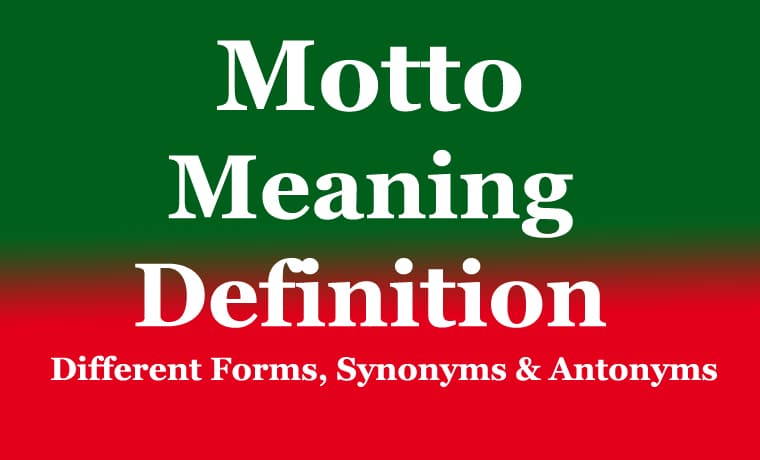Discover the significance of mottos in our comprehensive guide. Learn the meaning of mottos, their usage, synonyms, antonyms, and their impact on society. Explore the historical background, types, and relevance of mottos in contemporary life. Perfect for understanding these concise phrases that encapsulate guiding principles and inspire action.
Motto: Meaning, Usage, Forms, Synonyms, Antonyms, and Comprehensive Guide
Motto: Meaning and Definition
A ‘motto’ is a short phrase or sentence that encapsulates the beliefs, ideals, or guiding principles of an individual, group, institution, or organization. Mottos are often inspirational and serve as a reminder of values and goals.
Example Sentence
“The school’s motto, ‘Knowledge is power,’ encourages students to value and seek education.”
Forms of the Word “Motto
Noun: Motto
Definition: A short phrase or sentence that expresses a guiding principle or ideal. Example: “Their family motto, ‘Unity and Strength,’ reflects their belief in the power of togetherness.”
Verb Form: There is no verb form for the word “motto.” The term is exclusively used as a noun.
Adjective Form: There is no specific adjective form for “motto.” However, the concept can be described using the term “mottoed” in rare instances. Example: “The mottoed banner was displayed prominently at the entrance.”
Other Forms: There are no widely recognized other forms of the word “motto.”
Synonyms for Motto
Slogan: A short and memorable phrase used in advertising or politics. Example: “The company’s slogan, ‘Just Do It,’ is recognized worldwide.”
Catchphrase: A phrase that becomes popular and is often repeated. Example: “The catchphrase ‘To infinity and beyond!’ became famous from the movie Toy Story.”
Maxim: A short, pithy statement expressing a general truth or rule of conduct. Example: “The maxim ‘Actions speak louder than words’ emphasizes the importance of deeds over promises.”
Adage: An old and well-known saying that expresses a common experience or observation. Example: “The adage ‘An apple a day keeps the doctor away’ promotes healthy living.”
Mantra: A word or phrase repeated to aid concentration in meditation or to express beliefs. Example: “Her mantra, ‘Stay positive,’ helps her through tough times.”
Antonyms for Motto
Disbelief: Lack of faith or trust in something. Example: “His disbelief in the system was evident from his critical comments.”
Doubt: A feeling of uncertainty or lack of conviction. Example: “There was doubt in the team about the new strategy’s effectiveness.”
Indifference: Lack of interest, concern, or sympathy. Example: “Her indifference to the cause was surprising given her previous enthusiasm.”
You May Like: Societal
Eaustive Essay on Mottos
Introduction
Mottos are brief, impactful phrases that reflect the core values, beliefs, and guiding principles of individuals, groups, or institutions. These phrases are designed to inspire, motivate, and provide direction. In this essay, we will explore the meaning of mottos, their historical significance, various types of mottos, their functions in society, and their relevance in contemporary life.
Historical Background
The use of mottos dates back to ancient times, where they were often used by families, clans, and nations to express their ideals and values. For example, the Latin phrase “E Pluribus Unum” (Out of Many, One) has been a motto of the United States since the 18th century, symbolizing unity among diversity. Mottos have also been prominently used in heraldry, where they appear on coats of arms and banners to represent the ethos of noble families and institutions.
Types of Mottos
Personal Mottos: These are phrases adopted by individuals to reflect their personal beliefs and goals. For example, “Carpe Diem” (Seize the Day) is a popular personal motto encouraging people to make the most of the present moment.
Family Mottos: Many families, especially those with a long lineage, adopt mottos that represent their shared values and heritage. For instance, the Kennedy family’s motto is “Ask not what your country can do for you; ask what you can do for your country.”
Corporate Mottos: Businesses often use mottos to convey their mission and values to customers and employees. For example, Google’s motto, “Do the Right Thing,” reflects its commitment to ethical practices.
Institutional Mottos: Schools, universities, and other institutions frequently use mottos to encapsulate their educational philosophy and aspirations. Harvard University’s motto, “Veritas” (Truth), underscores its commitment to truth and knowledge.
National Mottos: Countries use mottos to express national ideals and identity. For example, France’s motto “Liberté, Égalité, Fraternité” (Liberty, Equality, Fraternity) encapsulates the values of the French Republic.
Functions of Mottos
Inspirational Tool: Mottos serve as powerful sources of inspiration. They remind individuals and groups of their goals and values, motivating them to strive for excellence and integrity.
Identity and Unity: Mottos help in building and reinforcing identity. They provide a sense of belonging and shared purpose, whether it’s within a family, organization, or nation.
Guidance and Direction: Mottos offer guidance in decision-making and behavior. They act as benchmarks against which actions and choices can be measured, ensuring alignment with core values.
Marketing and Branding: In the corporate world, mottos are crucial for branding. They communicate a company’s ethos and differentiate it from competitors, helping to build customer loyalty and trust.
Relevance in Contemporary Life
In the modern world, mottos continue to play a significant role across various domains. Their simplicity and directness make them effective tools for communication and motivation.
In Personal Development: Many people adopt personal mottos to guide their actions and decisions. These mottos serve as daily reminders of what they aspire to achieve and how they wish to live their lives.
In Education: Educational institutions use mottos to inspire students and staff. These phrases often encapsulate the institution’s educational philosophy and aspirations, fostering a culture of excellence and integrity.
In Business: Companies use mottos as part of their branding strategy. A well-crafted motto can communicate the company’s mission and values to both employees and customers, helping to build a strong corporate identity.
In Sports: Teams and athletes often adopt mottos to motivate themselves and their supporters. These mottos can inspire perseverance, teamwork, and the pursuit of excellence.
Famous Mottos and Their Impact
Certain mottos have gained widespread recognition and have had a significant impact on society. For instance, Nike’s motto “Just Do It” has become synonymous with motivation and determination, encouraging people to take action and pursue their goals.
Another notable motto is “In God We Trust,” used in the United States. This motto reflects the nation’s historical reliance on a higher power for guidance and protection.
Conclusion
Mottos are powerful tools that encapsulate core values, beliefs, and guiding principles. They inspire, motivate, and provide direction, helping individuals and groups to stay focused on their goals. As we navigate the complexities of modern life, mottos continue to serve as valuable sources of guidance and inspiration, highlighting the enduring importance of these concise phrases in our lives.
FAQs on Motto
1. What is a motto?
A motto is a short phrase or sentence that encapsulates the beliefs, ideals, or guiding principles of an individual, group, institution, or organization.
2. How are mottos used in everyday life?
Mottos are used in personal development, education, business, and sports to inspire, guide, and motivate individuals and groups. They help communicate core values and principles.
3. Can mottos vary between cultures?
Yes, mottos can vary between cultures. Each culture may have its own set of mottos that reflect its unique values, beliefs, and traditions.
4. Are there any verb or adjective forms of the word “motto”?
The word “motto” is used exclusively as a noun. There is no widely recognized adjective form, though “mottoed” can be used in rare instances. There is no verb form for “motto.”
5. What are some synonyms for the word “motto”?
Some synonyms for “motto” include slogan, catchphrase, maxim, adage, and mantra.
6. What are some antonyms for “motto”?
Antonyms for “motto” include disbelief, doubt, and indifference.
7. Why are mottos important?
Mottos are important because they encapsulate core values, beliefs, and guiding principles. They inspire, motivate, provide direction, and help build a sense of identity and unity.
8. How can I use mottos effectively?
To use mottos effectively, choose phrases that are meaningful and relevant to your values and goals. Use them as reminders and sources of inspiration to guide your actions and decisions.
This comprehensive guide aims to provide a thorough understanding of mottos, their significance, and their application in various aspects of life. The simplicity and directness of mottos make them valuable tools for conveying core values and inspiring action. 0 0 0.
N.B. If you found the article helpful, we would love to hear your thoughts and feelings. Your suggestions and constructive feedback are greatly appreciated!











